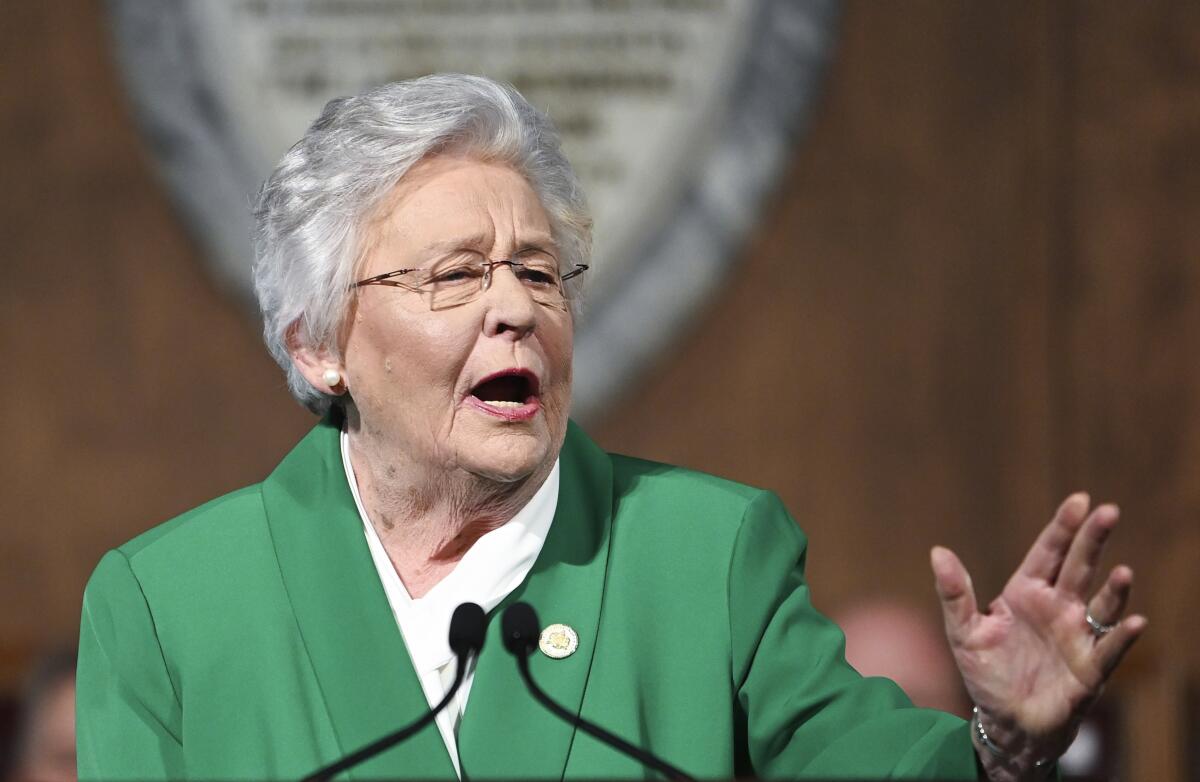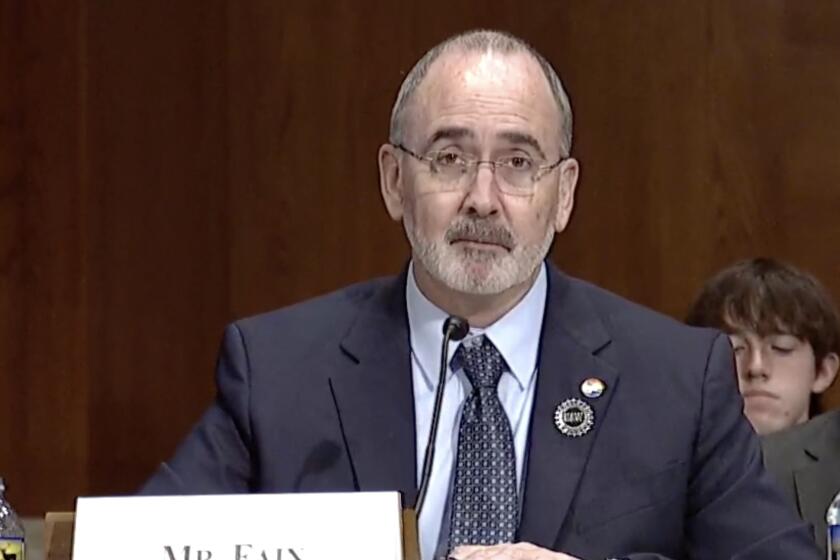Column: How anti-union Southern governors may be violating federal law

Six Republican governors in the Deep South want their constituents to know that they’re looking out for them.
That’s why they issued a joint statement earlier this year condemning the organizing campaign launched by the United Auto Workers at auto plants across the region.
“As governors, we have a responsibility to our constituents to speak up when we see special interests looking to come into our state and threaten our jobs and the values we live by,” the governors said.
We have one federal labor policy, not 50 different state policies, when it comes to union organizing and collective bargaining.
— Benjamin Sachs, Harvard Law School
Three of the governors have gone further — signing laws denying state economic development subsidies to any employer that voluntarily recognizes a union (that is, without insisting on a formal vote by workers). They’re Kay Ivey of Alabama, Brian Kemp of Georgia and Bill Lee of Tennessee.
These steps raise the question of whether those governors and other political leaders are breaching federal labor law by their actions, which could prompt the government to invalidate unsuccessful union votes and order new elections.
Get the latest from Michael Hiltzik
Commentary on economics and more from a Pulitzer Prize winner.
You may occasionally receive promotional content from the Los Angeles Times.
“We have one federal labor policy, not 50 different state policies, when it comes to union organizing and collective bargaining,” says Benjamin Sachs, a professor of labor and industry at Harvard Law School and the author of a recent article examining how the actions of anti-union politicians may have illegally interfered with employees’ right to “a free and untrammeled choice for or against” a union.
Sachs acknowledges that the rules governing federal preemption of state labor laws are murky about the conditions in which federal labor law would prevail, and also the point at which politicians’ actions render union representation elections unfree and unfair — threshold findings that would prompt the National Labor Relations Board to invalidate an election and order a new vote.
The billionaire owners of Wonderful Co. — grower of almonds and pistachios — say a California farm labor law is unconstitutional.
That said, “Alabama probably can’t condition its economic incentives on the relinquishment of the federal right” to voluntary recognition of a union, Sachs told me. But he adds that how any such case unfolds would depend on the federal court that heard it.
Political interference in union organizing campaigns in the South isn’t new. In 2014, Sen. Bob Corker of Tennessee and the state’s then-governor, Bill Haslam — both Republicans — threatened Volkswagen with retribution for taking a tolerant view of a UAW organizing campaign at its factory in Chattanooga.
One visiting VW executive referred positively to the labor-management “works councils” common in the company’s home, Germany: “Volkswagen considers its corporate culture of works councils a competitive advantage,” he said.
Corker, a former Chattanooga mayor, voiced an almost certainly specious claim that VW executives had “assured” him that the company would open a new SUV manufacturing line at the plant — if the workers turned the UAW down. A local VW executive denied that.
After losing the election, the UAW filed an unfair labor practices complaint with the NLRB, but ultimately withdrew it. The union lost another election at the plant in 2019, but two months ago it won a third election there, its first victory at an auto plant in the Deep South.
As the UAW stepped up its campaign to unionize other plants in the South, the region’s Republican political leaders pushed back hard. In their joint statement, the governors of Alabama, South Carolina, Georgia, Mississippi, Texas and Tennessee accused the union of unspecified “misinformation and scare tactics.”
Parroting an argument straight out of the corporate anti-union playbook, they said, “The experience in our states is when employees have a direct relationship with their employers, that makes for a more positive working environment. They can advocate for themselves and what is important to them without outside influence.” All six states have automobile plants that could be targeted by the UAW.
One question relevant to whether the governors have crossed over to engaging in unfair labor practices that could invalidate a union election, Sachs says, is whether the NLRB could judge them to be “agents” of the employers. In that case, the board might consider their actions to be tantamount to actions by an employer interfering with the workers’ right to vote in a free and fair election.
After decades of defeats in its drive to unionize Southern auto plants, the UAW scores a big win in Chattanooga. Other plants are now in its sights
“It doesn’t seem too crazy that the board might find the elected officials to be agents of the employers,” Sachs says. In several cases in which an employer didn’t disavow statements by elected officials warning a plant would close or there would be a loss of jobs if its workers voted to unionize, the board found the election to be unfair. In similar cases, the board does not have to find that there was direct contact between the politicians and the employer.
The chief target of the anti-union laws signed by Ivey, Kemp and Lee is the “card check” procedure, one of the two paths to union recognition under federal labor law — the other being a secret ballot. In the card check process, after more than 50% of employees at a workplace sign authorization cards seeking representation by a union, the employers can voluntarily recognize the union, waive any demand for a secret ballot among the workers, and participate in negotiations.
The Alabama, Georgia and Tennessee laws deny state economic incentives to companies that accept card check authorizations without demanding a secret ballot. They also forbid employers to voluntarily provide unions with contact information for employees without the workers’ prior consent. These both are requirements that obviously make unionization drives harder.
Like other Republican state initiatives, the anti-unionization laws were incubated on the far right, specifically the Koch-backed American Legislative Exchange Council, or ALEC — the source of model laws aimed at cutting taxes, hamstringing healthcare reforms, privatizing public education, blocking environmental regulations and other such conservative hobby horses.
The anti-union laws in the three states are reproduced almost verbatim from a model law ALEC dubbed the “Taxpayer Dollars Protect Workers Act.” To put it another way, neither the state legislators nor the governors had to break a sweat to draft and enact these measures — they were spoon-fed the texts.
Southern states are generally quite candid about their efforts to attract manufacturers by guaranteeing them a low-wage rank-and-file workforce and union-free factory floors. On its economic development web page, for example, Oklahoma even brags about how much lower than national averages are the median hourly wages in 12 occupational categories — $17.01 for machinists vs. $19 nationally, $26.17 vs. $30.75 for construction managers, and so on.
Oklahoma doesn’t have any auto plants, but hope springs eternal. Oklahoma and the six states whose governors signed the anti-union letter are all “right-to-work” states, which ban contracts requiring all workers in a unionized workplace to be union members.
Evidence shows that a 32-hour, four-day workweek with no reduction in pay is good for workers and employers. Why isn’t it a rule in the U.S.?
In signing Alabama’s measure denying economic incentives to employers that voluntarily negotiate with unions, Ivey declared, “Alabama is not Michigan. ... We want to ensure that Alabama values, not Detroit values, continue to define the future of this great state.”
She said a mouthful. The median annual wage in Alabama was $41,350 last year. In Michigan, where unions are popular, it was $46,940. That’s higher than in any of the other states whose governors signed the anti-union letter. (The median wage in Mississippi, whose governor, Tate Reeves, signed the joint statement, was $37,500, the lowest in the nation.)
Whether states can use their economic incentives to ban card check recognition may have to be weighed by the courts. As John Fry of Harvard Law observed in a report earlier this year, states clearly can’t outlaw card check agreements directly — such agreements are legal under federal law, which protects voluntary recognition of a union and the voluntary sharing of employee contact information.
As for wielding economic incentives as a weapon, the Supreme Court has ruled that states can impose labor-related rules mostly when they’re applied to projects in which the states have a direct interest, such as public works projects.
But the issue is almost certain to come before the courts again; following its negotiating successes with the Big Three automakers last year, the UAW announced a two-year, $40-million campaign to organize nonunion plants “across the country, and particularly in the South.”
The union lost a unionization election last month at Mercedes plants in Alabama, but has now turned its attention to a Hyundai plant in the same state. Politicians across the South are sure to react with ever more draconian laws and policies aimed at forestalling unionization. Will they be smart enough to keep on the right side of the legal line? Possibly, but that’s not the way to bet.
More to Read
Get the latest from Michael Hiltzik
Commentary on economics and more from a Pulitzer Prize winner.
You may occasionally receive promotional content from the Los Angeles Times.














